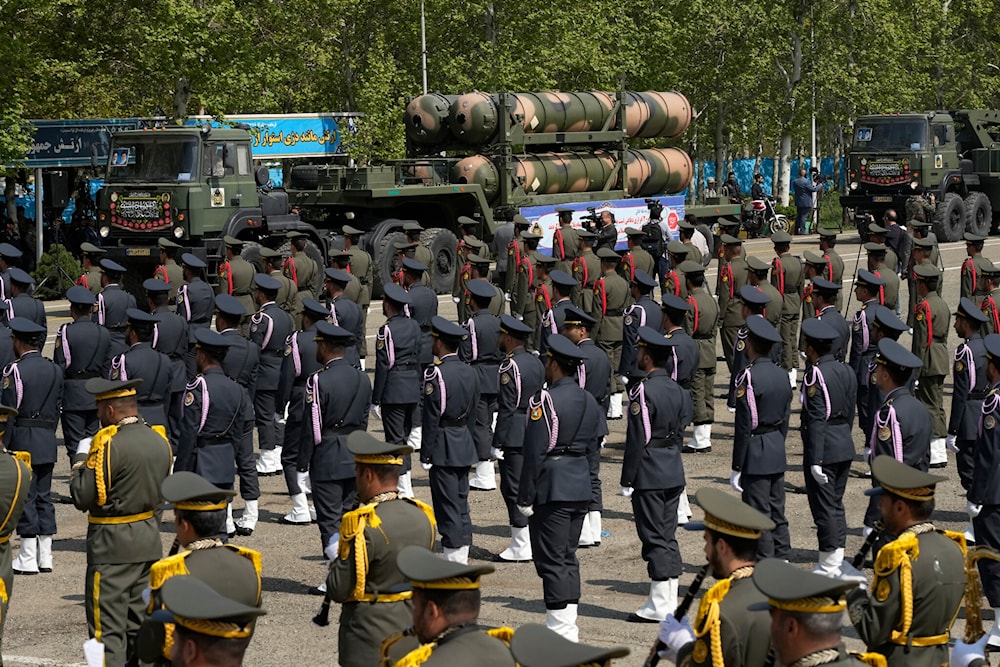'Israel' scaled back planned attack on Iran to avoid new counterattack
The planned strike on Iran was initially intended to be more extensive in scale, but Israeli officials reportedly opted to reduce its scope following significant pressure from allies.
-

An air defense system is carried on a truck during the Army Day parade at a military base in northern Tehran, Iran, April 17, 2024. (AP)
A new report by The Wall Street Journal, citing three senior Israeli officials on Monday, stated that "Israel" scrapped plans for a significantly larger strike on Iran due to concerted diplomatic pressure from the United States and other allies.
Israeli officials initially deliberated on striking multiple military targets throughout Iran last week, including locations near Tehran, the Iranian capital, in response to the Iranian retaliatory strike on April 13, which was in itself retaliation for an Israeli attack on the Iranian consulate in Damascus, as reported by officials speaking anonymously to discuss sensitive matters.
The report contended that such an extensive and impactful strike would have been more difficult for Iran to ignore, heightening the likelihood of a robust Iranian retaliatory action. So, "Israel's" repeated provocations and the accompanying retaliation could have forced the region into a full-blown war.
Ultimately, following appeals from President Biden, as well as the British and German foreign ministers, urging Israeli Prime Minister Benjamin Netanyahu to prevent a broader struggle, "Israel" chose to execute a more restricted strike on Friday, the report further claimed. This minimized significant damage and reduced the likelihood of escalation, at least for the time being.
"Still, in the view of Israeli officials, the attack showed Iran the breadth and sophistication of Israel’s military arsenal," the report claimed.
While this is the Israeli intake, Iranian officials belittled the alleged Israeli attack, driving a member of the delegation of Iranian Foreign Minister Hossein Amir-Abdollahian at the UNSC to ask "What strike?" with a snort when the FM was asked about his stance on the reportedly Israeli drone attack that targeted the Iranian city of Isfahan and whether Iran would retaliate.
A reporter asked Iranian Foreign Minister Hossein Amir-Abdollahian as he was exiting the United Nations Security Council meeting about his opinion on the Israeli strike on #Isfahan, asking if #Tehran would retaliate, to which a member of the Iranian delegation accompanying the… pic.twitter.com/pvSZvy4dcY
— Al Mayadeen English (@MayadeenEnglish) April 19, 2024
Dive deeper
"Israel’s" military and political leaders began discussing a potential new strike as soon as Iran initiated its retaliatory strike, even before the extent of the damage caused by the drones was known.
Despite claiming no damage was recorded, a senior American official told ABC News that at least nine Iranian missiles penetrated Israeli air defenses and hit two Israeli air bases.
He added that five ballistic missiles hit the "Nevatim" Air Base, causing damage to a C-130 transport plane, a runway, and storage facilities.
The official said that four additional ballistic missiles hit the "Negev" Air Base.
Later, Iranian leaders confirmed that the Israeli warplanes that carried out the aggression that targeted the Iranian consulate in Damascus took off from "Nevatim".
According to one official, the military chief of staff, Lt. Gen. Herzi Halevi, and his Air Force chief, Tomer Bar, presented the plan to the Israeli war cabinet early on Friday, April 12 — two days prior to Iran’s attack.
However, "Israel's" plans shifted following Iran's attack, as officials stated that it surpassed expectations. The attack was described as one of the largest of its kind in military history.
It is worth noting that "Israel's" air defense systems had to coordinate with pilots from the United States, Britain, France, and Jordan to intercept the Iranian strike. Meanwhile, there were deliberations about whether "Israel should divert its focus from defense while the assault was ongoing," WSJ cited two officials as saying.
The report stressed that the pivotal moment occurred during an early-morning phone conversation between Prime Minister Netanyahu and President Biden, in which the American President advised the Israeli Prime Minister to perceive the alleged "success" in defense as a triumph that did not necessitate additional action, as described by three Israeli and Western officials speaking anonymously as per the report. Following the call, Netanyahu opposed an immediate retaliatory response, as per the Israeli sources.
The Israeli government began indicating to foreign allies the day after that it still intended to retaliate, albeit in a restrained manner significantly less aggressive than originally intended, according to one of the senior Western officials as cited by WSJ.
Instead of pursuing a wide-ranging counterattack that could potentially compel Iranian leaders to respond in kind, Israeli officials opted for a strategy aimed at conveying a message to Iranian officials while avoiding public humiliation, according to the report.
Israeli officials revealed as quoted by WSJ that the attack was initially scheduled for Monday night but was called off at the last minute due to concerns that Hezbollah might escalate its strikes on northern "Israel".
It is worth noting that "Israel" didn't claim responsibility for the attack on Iran.
Read next: Iranians mock Israeli strike on Isfahan

 5 Min Read
5 Min Read










